05. Ecological education
We promote environmental awareness among students through seminars and rallies, encouraging them to adopt eco-friendly practices. Additionally, we celebrate Environment Protection Week across all our schools to emphasize the importance of environmental conservation.
06. Human Rights Education

We provide Human Rights education to students up to the 9th standard, aiming to make education a tool for liberation. Our approach involves creating opportunities for students to learn about Human Rights through trained teachers, seminars, exposure activities, and cultural programs. We celebrate Human Rights Day in a meaningful manner and organize seminars and rallies to highlight Human Rights Education. Additionally, we encourage students to actively participate in rallies aimed at condemning human rights violations.
07. Sex Education
We acknowledge the significance of sex education for students and incorporate it into our curriculum through instructional sessions and cultural programs.
08. Feminism
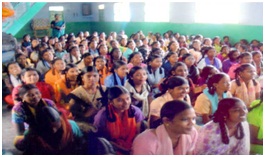
Education has long been recognized as the most powerful tool for altering the status of women in society. With the alarming rise in violence against women, we place significant emphasis on feminism, highlighting the following initiatives: commemorating International Women’s Day in a meaningful manner, raising awareness among parents about the importance of feminism, and educating students about the dignity and rights of women.
09. Experiential Education
We recognize the importance of practical social action and endeavor to provide opportunities for our students to engage in such activities. To bridge the gap between classroom knowledge and real-life experiences, we organize experiential-based programs including field trips such as village exposure, outreach programs such as visiting hospitals, refugee camps, and prisons to support victims of natural disasters and accidents, as well as various camps aimed at fostering understanding of the realities faced by the less fortunate in society.
10. Education for community involvement and service
- We guide our students to be socially conscious by engaging in social analysis and forming various movements aimed at conveying a broad vision of contemporary social issues. These movements include YCS (Young Christian Students), YSM (Young Students Movement), AICUF (All India Catholic University Federation), NCC (National Cadet Corps), Green Corps, Red Cross, AMSA (Awareness Movement of St.Anne), Literary Association, Guides and Scouts, and various other clubs.
- Additionally, we have a Past Pupils Association and organize activities through clubs, which provide excellent networking opportunities for students and a platform to connect with others who share similar interests and ideas.
- Joining a club enables students to explore their interests and develop leadership skills.
- Our schools offer a diverse range of club activities tailored to students’ age and interests, encouraging them to pursue their passions.

11. Education through Co-Curricular activities (CCA)
The co-curriculum extends beyond traditional classroom teaching and learning to encompass activities in the library, laboratory, workshop, participation in games and sports on the playground, and numerous informal interactions between teachers and students in these settings. Within these informal interactions lie a variety of activities, including co-curricular activities. These activities are an integral part of the institution’s curriculum, often voluntary, and distinct from the regular school curriculum.
Co-curricular activities (CCAs) play a vital role in our students’ holistic education. Through participation in CCAs, students have the opportunity to explore their interests and talents while developing values and competencies essential for navigating a rapidly changing world. CCAs also serve as a platform for students to forge friendships with peers from diverse backgrounds, fostering social integration and enriching their sense of belonging. Furthermore, engagement in CCAs cultivates a heightened sense of commitment and responsibility towards the school, community, and nation among students.
12. Sports and Games
Sports and games hold an integral position in the education provided at St. Anne’s, as they play a vital role in the holistic formation of our students. Many of our students have achieved notable success, winning prizes at the District, State, and even National levels in various sports and games.
13. Picnics and Educational Tours
Every year, the management arranges picnics and educational tours for our students. These trips serve to reinforce the concepts taught in the classroom, offering students a firsthand experience in a new environment. Additionally, they provide an opportunity for students to strengthen bonds with their classmates. Therefore, we organize educational trips as part of our school activities.
14. Faith Formation
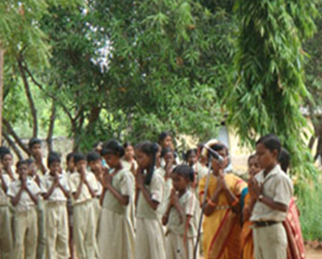

We are dedicated to fostering a Catholic culture of faith as a way of life for our Catholic students. This commitment includes providing a comprehensive catechetical course and introducing students to meaningful participation in the Church’s liturgy and prayer life. However, we also recognize the importance of spiritual formation for students of other faiths, who make up the majority of our school and college communities. Therefore, we place equal emphasis on supporting the spiritual development of all our students, regardless of their religious beliefs.
We support students in cultivating a personal set of values and principles, fostering character and integrity, and internalizing the social aspects of their religious traditions, leading to personal well-being. Additionally, we educate both students and staff to embrace and respect differences rooted in religion and culture, nurturing an environment of inclusivity and diversity. Moreover, we actively promote inter-religious dialogue on our campus as a means of fostering understanding and mutual respect among individuals from different religious backgrounds.
15. Students support initiatives
(i). Orientation Programmes
At the commencement of each academic year, we organize a one-day orientation program for all students.
(ii). Bridge Course
During the initial 15 days of the academic year, we conduct a bridge course to help students refresh their learning and prepare for the upcoming coursework.
(iii). Seminars and workshops to advance learning
In addition to the standard curriculum, we implement various initiatives to foster learning and comprehension among our students. Special seminars are orchestrated with the assistance of resource persons across diverse fields, including ecology awareness programs, English learning coaching classes, human rights sessions, leadership training programs, media education workshops, personality development workshops, psychological assessments and counseling sessions, sex education workshops, and yoga classes. These endeavors are geared towards providing students with a comprehensive education that nurtures their holistic development.
(iv). Computer Education
Computer education is an integral component of our curriculum, aimed at keeping students abreast of developments in information technology. Across all our schools, we have well-equipped computer labs with the necessary infrastructure. This ensures that students are well-prepared as they step into a world increasingly reliant on technology. Through computer education, our students gain valuable skills essential for navigating the modern, technology-driven landscape.
(v). Establishing Information and Communications Technology (ICT) Teaching Facilities
To enhance and support teachers’ professional competence, we provide opportunities for them to experiment with emerging technologies, thereby facilitating engaging and creative content delivery. Additionally, we aim to increase collaboration and networking among teachers, fostering communication and the exchange of ideas. Our goal is to transform teaching practices, making them more efficient and effective, thus enhancing teachers’ interest in their profession. Furthermore, we promote the reevaluation and revision of curriculum and instructional strategies. By encouraging students to undertake more independent work, we enable teachers to dedicate more time to teaching higher-level concepts in the classroom. Ultimately, our objective is to cultivate a multimedia presence in the classroom environment.
(vi). Tuition and remedial classes
For academically challenged students who may be slow learners, remedial classes are conducted before or after regular class hours. These sessions offer special care and attention to weaker students, which can be challenging to provide in a typical classroom setting. The remedial classes have proven beneficial for students, providing them with the opportunity to pass exams and realize their potential. As a result, remedial classes have significantly contributed to improving our overall results in board exams.
TEACHER CENTERED ACTIVITIES
01. Orientation Programmes
At the start of the academic year, an orientation program is held for all teaching staff, spanning at least two days.
02. Retreat for the staff
Once a year, a two-day common retreat is organized for all teaching staff members.
03. Refreshing Course
Once a year, in addition to government-organized programs, a two-day refreshing course is held for all teaching staff members. Below are some of the programs organized for teachers in our institutions:
(i). To improve teaching skills
Training programs on various subjects are organized regularly for our teaching staff, covering a wide range of topics such as English, Hindi, and Kannada training. Additionally, there are programs focused on life development from a psychological perspective, personality development, the significance of teamwork, and human rights education. Mentoring sessions specifically designed for science teachers are conducted to enhance their teaching skills, along with English grammar classes and workshops on effective teaching methods. Furthermore, we offer training in communication skills, life skills, and various teaching techniques. Special attention is given to strategies for working with underprivileged children. Our efforts also include initiatives to improve the quality of education and strategies for achieving better academic results. Additionally, we provide training programs on Electro Convulsive Therapy (ECT).
(ii). Seminars and workshops
We also conduct training sessions on essential skills such as time management and goal setting, both in professional and personal life. Additionally, we offer seminars on media awareness and organize sessions on YSM (Young Students Movement) and ecology to raise awareness about environmental issues.
(iii). Spiritual formation
Spiritual formation is provided to the Catholic staff through various initiatives. Annually, a two-day common retreat is organized for all teaching staff members, allowing them to deepen their spiritual connection and reflect on their faith. Additionally, methodology sessions on teaching faith formation are conducted to enhance educators’ abilities in this area. Media awareness programs are also integrated to ensure that staff members are equipped to navigate contemporary media landscapes responsibly. Moreover, the efficacy of Catholic education is underscored by its emphasis on the spiritual formation of Catholic students, prioritizing their growth in faith. Interfaith formation sessions for youth broaden their understanding of different religious traditions, fostering inclusivity and tolerance. Furthermore, studying St.Paul’s letters offers insights into early Christian teachings and principles. Finally, educators are encouraged to recognize their responsibility and accountability to God for the children entrusted to their care, reinforcing the sacred nature of their role in shaping young minds.
PARENT’S CENTERED ACTIVITIES
Parent-teacher associations (PTAs) are established in all our schools, serving as a vital platform for parents to engage with the teaching faculty. This interaction facilitates valuable feedback from parents regarding the home environment and its influence on students’ academic performance. Through personal case studies conducted by class teachers and insights gained from these interactions, appropriate steps are taken to enhance students’ academic achievement. The collaborative efforts of parents and teachers ensure a supportive learning environment conducive to students’ overall growth and success.
Additionally, parents are invited for personal discussions regarding their child as needed. During these discussions, any concerns or issues are addressed, and corrective measures are implemented. Often, this personalized approach leads to significant qualitative improvements in our students. In certain cases, staff members conduct home visits to gain a deeper understanding of the family background and offer assistance if required. This proactive engagement with parents and families underscores our commitment to the holistic development and well-being of our students.
HIGHER EDUCATION
“The higher education so much needed today is not given in the school, is not to be bought in the marketplace, but it has to be wrought out in each one of us for herself; it is the silent influence of character on character.”
“Thinking Big” in terms of providing quality education that shapes individuals of integrity, intellect, and innovation is the cornerstone of higher education. This approach empowers every student to make informed choices and fosters the development of a new and progressive society. Jawaharlal Nehru, in his address to the graduates of Allahabad University in 1947, eloquently stated, “Higher education stands for humanism, for tolerance, for reason, for the adventure of ideas and the search for truth. It stands for the onward march of the human race toward higher objectives.” These profound words underscore the importance of character formation in higher education, emphasizing values such as humanism, tolerance, reason, and the pursuit of truth as essential elements of intellectual and personal growth.
Higher education should liberate young individuals, granting them the freedom to express themselves, discern, challenge, appreciate, embrace positivity, and uniqueness, and fully embody their humanity. The ultimate objective of higher education is to integrate young individuals into society as responsible, engaged citizens.
We firmly believe that education is a noble mission, integral to the holistic development of students. With a particular focus on girls from marginalized communities, we establish colleges intending to provide them with opportunities for empowerment and advancement. This vision stems from our Mother Foundress, Thatipathri Gnanamma, who, in the 19th century, recognized the plight of women deprived of education and marginalized in society. Motivated by empathy and compassion, she ignited the flame of education, empowering women to overcome life's challenges and pursue their aspirations.
Mother Gnanamma Women’s College of Artsand Science
Varadarajenpet Via - Andimadam Ariyalur Dist - 621805
Tel: 04331 - 293711
Website : www.mothergnanammacollege.org

St.Anne’s Degree College for Women
No2, Cambridge Road Halarsuru Banglore - 560008
Tel : 080 - 25555014, 25544454
website : www.saintannescollege.in
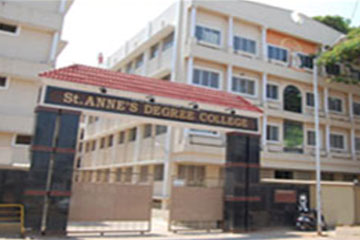
Sacred Heart First Grade College for Women
Jeevan Bhima Nagar Banglore - 560075
Tel: 080 -25231949, 25231950
website :www.shgfgc.org
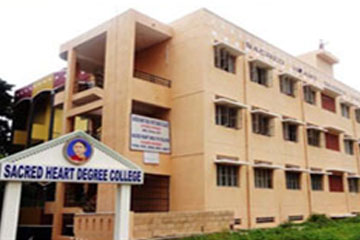
St.Anne's Arts and Science College
Kanakan Chatram Ponniammanmedu Chennai, Tamil Nadu - 600110
Tel: 044-25583529, 25584529
Website: www.ssacollegechennai.com
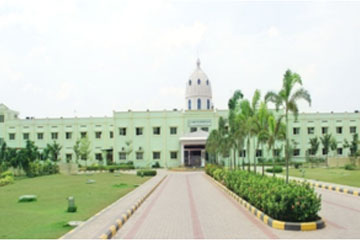
Finally
We instill in our students a deep awareness of the purpose and responsibility inherent in life. Through our teachings, we emphasize the importance of building homes founded on eternal values, ethical principles, and the teachings of Jesus. By fostering such values, we believe we can contribute to the creation of a more harmonious and just society. Ultimately, it is through these efforts that we envision the establishment of God’s Kingdom here on earth.
The influence of teachers on the minds and hearts of students is undeniably profound, a truth recognized across all generations. The success story of our educational institutions is attributed entirely to the collective efforts and unwavering dedication inspired by the call of God and the vision of our Foundress, Mother Gnanamma. While the world undergoes various changes - be it economic, social, or political - it remains evident that educating girl children holds transformative power. This education empowers them with economic independence, family responsibility, and a strong sense of social commitment. It is heartening to witness that students who have graduated from our institutions continue to uphold and cherish the values instilled in them during their formative years. They are steadfast in their conviction that these values distinguish them and contribute significantly to their success and standing in society.
It is truly gratifying to witness the remarkable team spirit, eagerness, and unwavering dedication demonstrated by all the sisters involved in the educational apostolate of our Congregation.
We are firmly convinced, deeply committed, strongly encouraged, and wholeheartedly dedicated to realizing the profound vision of our Foundress, Mother Gnanamma. Through our Education Ministry, we strive to expand growth opportunities and unlock the full potential of every individual, fostering an innovative and competitive community. We firmly believe that nurturing creative and holistic education is pivotal in cultivating a strong value system, fostering economic resilience, and fostering a flourishing society.